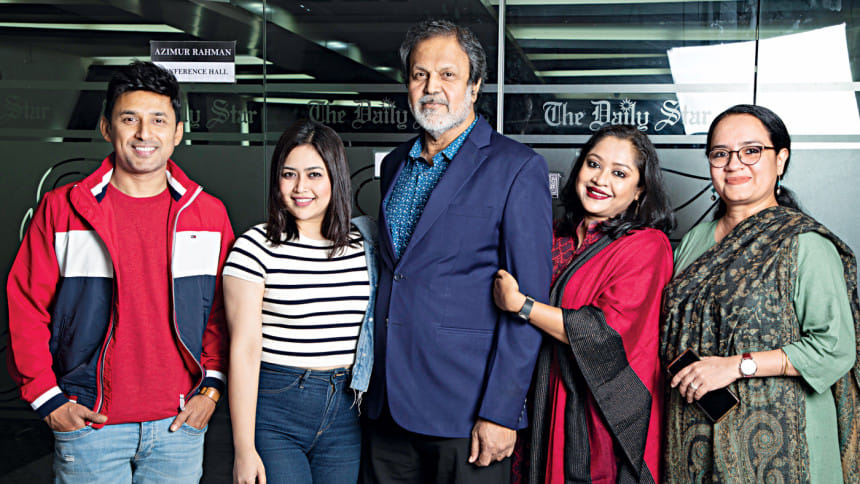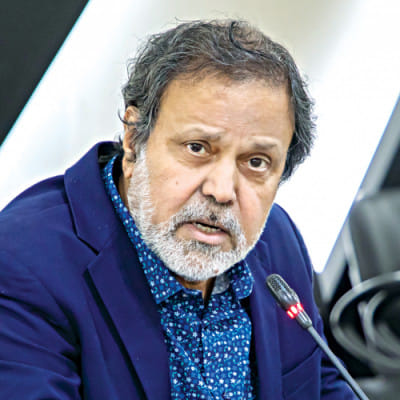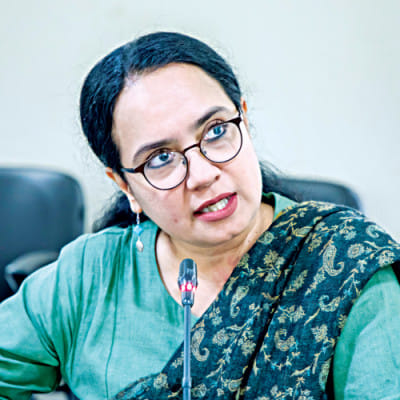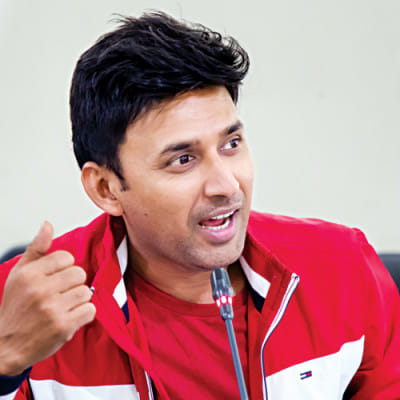Could the internet help evolve our entertainment industry?

Radio, theatre, television, film and OTT are now considered to be the five-primary mediums of audiovisual entertainment.
The internet played a crucial role in shifting the means of entertainment, from real-time or live consumption to easyily accessible content that can be consumed at leisure.
The internet, overall, has helped to create new avenues and patterns of work in the entertainment industry as well.
The Daily Star organised a roundtable discussion with five artistes –Tariq Anam Khan, Tropa Majumdar, Naznin Hasan Chumki, Ashna Habib Bhabna and Manoj Pramanik – who belong to five different generations of the industry and have experience working in every medium of entertainment.
Eminent actor Tariq Anam Khan, also a theatre director, is dearly known as a mentor to actors like Mosharraf Karim and Zahid Hasan. To him, the theatre was a school of acting, a home for practising and improving acting skills.
"A performer gets the chance to discover, rediscover and improvise in front of the live audience. This particular experience is an ancient process, and yet, very crucial for an actor to date. In today's world, this is the only medium left, where there is a live interaction between the audience and performers," said Tariq.

"In our country theatre is not considered as a professional medium of acting, as of yet"
He also added that theatre has been badly affected because of the glittering image curated for showbiz. Thus, the medium has not evolved in Bangladesh, compared to the international theatres.
"In our country, theatre is not considered as a professional medium of acting, as of yet," he said.
Live broadcasting is changing theatre, but it fails to account for live interactions between the performers and the audience.
However, actor Manoj Pramanik had a different take on this matter. "Besides being a theatre worker, I am also a teacher. My students often ask me if theatre is still required in today's world," shared Manoj.
He explained that other than live interaction, stage performance has no unique feature that can drag the audience to the theatre.

"Over the last three decades, the entertainment industry was going at a slow pace, which increased its rate due to over-the-top services"
"The digital transformation is gearing upon the acceleration rather than speed of learning and observing the beauty of life," said the actor. "Today's generation is faster and hence, they find it too hard to connect with us.
They have also had a hard time connecting with the work of theatre artistes as it is yet to upgrade its game with the changing course of time. Ironically, the term 'live' has become a technology, it means live streaming, and no longer live interactions," he added.
Noted artiste Tropa Majumdar explained how the priority for the young generation has been diverted due to digitalisation. "Virtual communication has become more important than live communication to the younger generation. This could be one of the reasons why youngsters cannot relate to theatre."

"I have been taking tips by watching my seniors acting on the screens, until I joined Jamil Ahmed Sir's workshop. It changed my life, and perspective as an artiste"
While addressing the issue, she also shared one of her recent experiences of watching a theatre show in Kolkata. "It amazed me when I witnessed a young crowd eagerly coming to the theatre to watch a show, that has none of this so-called 'speed'."
"They have access to the internet, and at the same time, they need to have the urge to experience art in its original form. This is a basic orientation that our children lack, and the education system is responsible for this," added Tropa.
Tariq Anam Khan stated that due to Dhaka's heavy traffic and theatres being few and far between, it is extremely difficult for people to want to watch live performances. "If we had more theatres in Dhaka, I am sure that there would be more interest locally."
Ashna Habib Bhabna is a trained classical dancer, who had no previous schooling in acting before she began working on the screens. "As an actor, I always felt that I needed someone to guide me. My acting on screen had no educational base, all that I have learned, I learned from senior and veteran actors," she shared.

"The digital transformation is gearing upon the acceleration rather than speed of learning and observing the beauty of life"
Later on, Bhabna shared that she felt the need for proper training and joined Spordha, led by theatre legend Jamil Ahmed. "It was one of the best experiences I had as an actor," she added.
Digital media has also taken over television, enabling them to consume content at their own pace, according to their time. The plethora of advertisements while watching TV dramas or shows has also made viewers averse to this medium, coupled with the declining quality of the content.
"We now focus on working in a local context with a global perspective, which is a crucial stage when it comes to the transformation of our entertainment industry," said Tropa, who believes that local OTT platforms have great potential in this regard.
"The morality of television has become questionable due to a lack of quality-control. OTT has raised the bar of expectations, whereas television channels are also widening their wings on the web," said actress Naznin Hasan Chumki.
"We are fortunate to have witnessed the technology that changed the entire world. Sadly, we are still waiting to use this powerful tool for our own good," she added.
Bhabna added, "Many good creators, including Masu Ake and Munzereen Shahid, have used the internet for great and positive effects, so there is a good example to follow".
Naznin pointed out that the masterful works and the lives of maestros from the entire world are being preserved, through archiving or remastering the older tapes of their work. "Even our neighbouring countries have done this, but we are still lacking on that front."

"The greed for viewership and 'viral content' has resulted in a decline in our quality of work"
Tariq Anam Khan expressed his concerns about the quality of the archiving method for our local content, saying that it is quite poor compared to international standards. "It could be a great opportunity for us to use the archiving for our brilliant artistes. However, that is not the case."
"The internet offers me the whole world, but when I want to know about the gems of my fraternity, including the likes of Munir Chowdhury, or Syed Shamsul Haque, I fail to get a complete archive of their careers. Somehow, we cannot represent our culture to the world, where this should have been our major priority," said Naznin.
In the run of relevance, radio is one medium that has heavy competition from streaming services, while the internet is a different threat altogether.
"Every medium is focusing more and more on the visuals, and in this race, radio has lost its charm," said Tariq Anam Khan. "The prevalence of FM Radio is almost being replaced with byte-sized clips and free streaming shows."
Naznin Hasan spoke from her experience working in radio stations both as a voice artiste and a radio jockey. "Earlier, people had an interest, a certain curiosity, to know about the artistes behind the voices on the radio. It was like magic to them. However, it has lost its charm amidst the growing appeal of visuals," she opined.
Bhabna, on the other hand, felt that podcasts and audiobooks are some of the positives that technology has to offer in terms of audio-based entertainment.
Tariq Anam Khan further noted that our film industry, despite having high-end tools, is not digitalised yet. "The internet helps spread the news, from launching the poster to the trailer, and the reviews. These are great tools to have a positive impact on films. However, we lack the mechanisms of controlling piracy, like foreign industries," he said during the discussion, emphasising the need of digital ticketing as well.
Tariq also expressed his interest in exploring his art more on the silver screens. "We have to start working on counter-narratives. The moment we start telling our own stories, we will make a mark globally," he added.
All of the artistes participating in the roundtable discussion agreed that OTT has a prospectus to stand out globally. "This medium has also had a great impact on the film industry," shares Tropa. The subscription-based personal platforms have created competition for other media as well.
"Over the last three decades, the entertainment industry was going at a slow pace, which increased its rate due to over-the-top services," asserted Tropa, who also believes that the government has a great role to play to strengthen the fraternity.
"Cricket would not reach where it is, if the government would not extend their hands to this field. But the government has never taken art and culture seriously. The responsibility should not only be on the corporate and non-government sectors," said Tropa.
She also stressed the fact that educational institutes dearth of cultural knowledge. "The results are alarming, which is resulting in severe intolerance, ignorance and religious extremism as well," shared Tropa.
According to Manoj, OTT has shown a sign of prosperity. "It is one's choice to subscribe and most importantly, it has a huge archiving system."
Adding to that, Tariq Anam Khan said, "Content certification in OTT platforms has been great so far. It will also help the other mediums improve their guidelines as well."
"As artistes, it is our responsibility to maintain the standard of our content. The greed for viewership and 'viral content' has resulted in a decline in our quality of work," said Naznin.
Tropa, on the other hand, opined that entertainment is not just serving the sole purpose of entertaining, rather, it helps the audience to think, realise and act. "We tell stories in every medium, but our target is to connect with the audience, to send a message to them, to raise awareness."
In conclusion, the artistes agreed on the fact that despite technological advancements, the industry is still at a dearth of professionalism and a proper auditioning system. Although OTT platforms have encouraged or rather compelled other media to step up their game, we have still a long way ahead to a proper evolution of our entertainment sector.

 For all latest news, follow The Daily Star's Google News channel.
For all latest news, follow The Daily Star's Google News channel. 



Comments